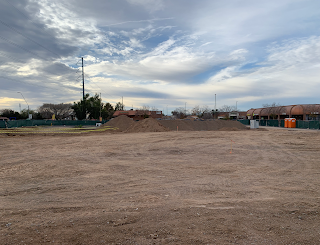Living with only the spoken word in old-time Phoenix
As someone who loves to read, which I began doing as a kid reading comic books, I've always enjoyed the written word. I've had library cards everywhere I've lived, and discovered, as I got older, than I comprehend things better with the written word than with the spoken word. In other words, if I want to understand something, I prefer to read about it, not have someone standing there talking to me. When I started teaching, back in the early 21st century, I learned that most people preferred the spoken word, at least the ones who signed up for my software classes. Presumably people who had a different learning style just picked up stuff from books, like I did. I never took a software class in my life - I was just handed a book, and was told to just learn it by my boss. That turned out to be the best thing for me, and I still learn the latest technology that way.
When I want to learn about something, I just HATE having to listen to someone talk. To me, it's ponderously slow, as they gaze off into the distance, say, "Yep, yep, yep..." and begin to talk, slowly organizing their thoughts, which can be a jumble. I tend to interrupt these people, and ask questions, and if they go off on tangents, I just tune out. And of course all of this has got me thinking about people who are functionally illiterate, and who rely on the spoken word entirely. I've met a few in my modern world, although they're rare, but my best guess about old-time Phoenix is that you would have met a LOT of them.
Now calm down here, I'm not criticizing these people. They usually have a very good reason for never getting interested in "book learning". The level of basic education back in old-time Phoenix may have been high or low, I don't know, but it seems to me that a good percentage of students wouldn't value books as much as they would value doing something practical, like helping out on the farm.
Since you're reading this, you are obviously not functionally illiterate, and it may be very difficult for you to image people who would get no more out of these words than if they were just a jumble, like this: kjsdkljlkjdfljk kldkjflkjlklk klkjlkjlkjlk. And the greatest risk to relying on the spoken word is losing your hearing, which often happens to people when they reach an advanced age. Nowadays, of course, there are medical ways to improve hearing, and they would have been around in old-time Phoenix (mostly ear trumpets) but it's gotta be an unpleasant sensation (I'm lucky to still have excellent hearing in my sixties, but I use it mostly for entertainment, not information).
In my lifetime, the number of people who can read things like "No Parking" is so high that the presumption is that they are ignoring the words if they park there, and it's a good presumption. But if you parked next to a sign that said "jk lkjlkjjh" you would get a better feel for being functionally illiterate, and there would have been many more people like that in old-time Phoenix!
"Hey there, buddy, can'cha read?!"
Image at the top of this post: the corner of Central and Adams in the 1940s. More people could read than before, and there are signs, but the spoken word, and the whistle, were vital for traffic control.
Help support history adventuring, and see a lot of cool old photos of Phoenix on Patreon
Click here to become a Patron!




The traffic cop in the white shirt is future Phoenix Police Chief Charlie Thomas.
ReplyDelete